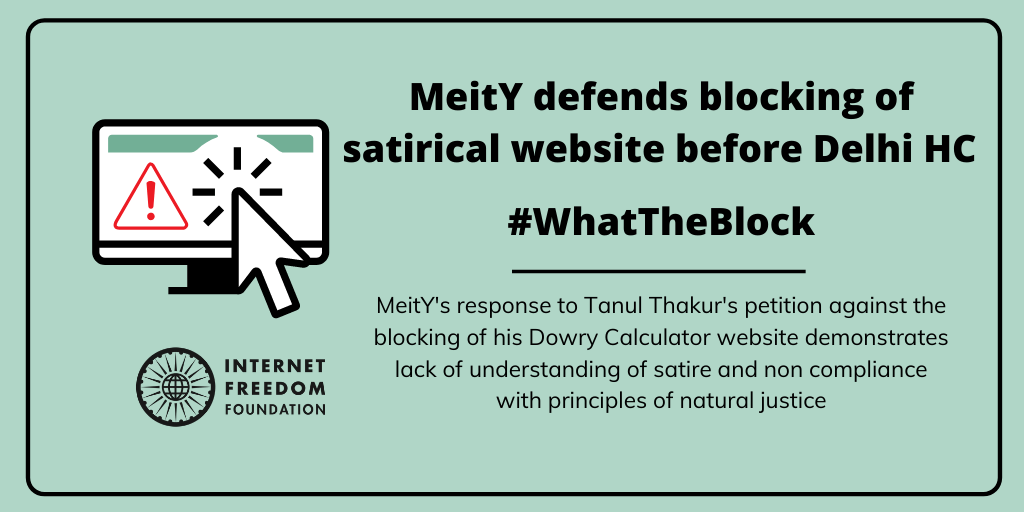
Tl;dr
In November 2019, creator of the satirical Dowry Calculator website, Tanul Thakur, filed a writ petition before the Delhi High Court challenging arbitrary blocking of his website. In its response to the petition, MeitY has cited provisions of the Dowry Prohibition Act 1961, which prohibit giving and taking of dowry and ban individuals from publishing advertisements offering dowry, as the justification for blocking the Dowry Calculator website. MeitY has also alleged that it could not provide notice or hearing to the Petitioner prior to blocking his website because they couldn’t find his contact details even though the screenshot of the website attached by MeitY clearly displays his name and Twitter handle.
Conflating Satire with Abetment and Advertisement
For those of you who may be unaware, Dowry Calculator is a satirical website created by Tanul Thakur in 2011 which generates a fictional dowry amount for every individual based on age, height, skin colour, alma mater etc. The satirical intent of the website is quite evident from its content and design. For instance, when one tries to pick a skin colour, the options include ‘Pitch Black (Not visible on a Moonless night)’ and ‘Wheatish (Almost white. Would need some fair n Lovely).’ The website also states that it is “dedicated to all the match-making aunties of India.” The website was blocked in 2018 after social media outrage by prominent politicians like Jyotiraditya Scindia. Read more about the controversy here.
In its reply to Tanul Thakur's petition challenging the blocking of his website, the Ministry of Electronics and Information Technology (MeitY) has failed to engage with the Petitioner’s arguments about his website’s satirical nature. Instead, MeitY has relied on Sections 3 and 4A of the Dowry Prohibition Act, 1961 to justify blocking of the website. Under Section 3, MeitY has accused the Petitioner of abetting the offence of giving and taking of dowry. When faced with arguments about the right to satirise, MeitY has summarily dismissed any possibility of the website using humour to criticize a social evil merely because it does not contain an explicit disclaimer about being satire.
Another provision invoked by MeitY is Section 4A which prohibits any individual from publishing advertisements offering any money or property as consideration for the marriage of his son or daughter or any other relative. Section 4A is clearly inapplicable in the context of Dowry Calculator which parodies and mocks the patriarchal practice of dowry rather than glorifying it. In any case, Section 4A can be invoked only if an individual offers dowry for the marriage of his/her relative and this key ingredient is missing in the case of Dowry Calculator.
Error: User Not Found
The constitutional validity of Section 69A of the Information Technology Act, 2000 which empowers the Central Government to block websites was upheld by the Supreme Court in Shreya Singhal v. Union of India because there is a mandatory obligation to provide notice and hearing to an individual prior to blocking his/her website. However, as Tanul Thakur’s case amply demonstrates, these procedural requirements are frequently flouted by the authorities. Lack of notice and hearing was one of the main contentions raised in the writ petition and you can read more about it here.
In its response, MeitY has alleged that it could not provide notice to the Petitioner because there were no contact details available on the website. This is contrary to the screenshots of the website which have been annexed by MeitY which clearly feature the name and Twitter handle of the Petitioner. Moreover, a simple WHOIS search also provides the email ID of the Petitioner. Therefore, it is difficult to believe that all reasonable efforts were made by MeitY officials to provide notice and hearing to the Petitioner.
Defending Secrecy in Website Blocking
The writ petition challenges the constitutionality of the confidentiality requirement present under Rule 16 of the IT Blocking Rules 2009 in so far as it applies to owners, creators, developers and curators of blocked content. This was necessary because MeitY had previously invoked Rule 16 to reject the Petitioner’s RTI application seeking a copy of the blocking order and complaint.
MeitY has argued that Rule 16 is necessary to protect the identity of the person who reports any website for hosting illegal content, and disclosure of such information would violate the fundamental right to privacy and jeopardize the safety of whistleblowers. While personally identifiable information of whistleblowers deserves protection, this does not explain why complaints received from Nodal Officers of Government Ministries and Departments, recommendations of the Committee for Examination of Requests and orders issued by the Designated Authority cannot be disclosed. If these documents contain any personally identifiable details of a private individual, those details may be redacted but a copy of these documents must be shared with the person whose website has been blocked.
The next date of hearing in the case is 21 May 2020 and the Petitioner will file his rejoinder before then. IFF has been providing litigation and RTI assistance in this case since 2019 and we are grateful to Advocates Siddharth Agarwal, Vrinda Bhandari and Abhinav Sekhri for representing the Petitioner before the Delhi High Court.
Important Documents
- Copy of Reply filed by MeitY (link)
